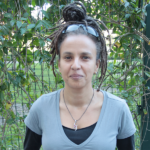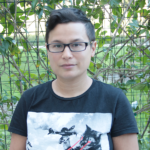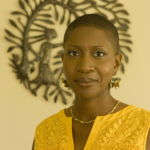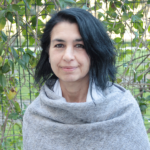Residential Research Groups (RRGs) are the longest-standing grant program at UCHRI, and these groups remain the cornerstone of our grantmaking activities. RRGs are in essence teams of researchers—often unknown to one another before residency—who convene at UCHRI for one quarter to accomplish a commonly-defined research agenda. In Winter 2017, UCHRI hosted a residential research group that focused on the scholarship addressing Queer of Color formations and translocal spaces in Europe.
Traditionally, collaboration in RRGs may take many forms. Cooperation across disciplines elicits challenges of language, terminology, and methodology for all RRGs. The organizing premise of the residential research program is that when those challenges are surmounted, breakthroughs in knowledge are possible. Listen to a podcast with the RRG conveners to hear how this collaboration worked in practice:
To further represent this interdisciplinary knowledge sharing, we have asked the RRG to craft an interdisciplinary bibliography that represents each individual member’s research and perspective on queer of color formations in Europe. Taken separately, these materials represent key materials selected by scholars of an emerging field of study; when combined, the sources highlight the rich landscape of critical refugee studies and its potential to transform scholarship.
Paola Bacchetta, Gender and Women’s Studies, UC Berkeley
Fatima El-Tayeb, Literature and Ethnic Studies, UC San Diego
 Fatima El-Tayeb is professor of Literature and Ethnic Studies and director of Critical Gender Studies at the University of California, San Diego. She is the author of three books, Undeutsch. Die Konstruktion des Anderen in der postmigrantischen Gesellschaft (Ungerman. The Construction of Otherness in the Postmigrant Society), Transcript 2016, European Others. Queering Ethnicity in Postnational Europe (University of Minnesota Press 2011; German translation: Anders europäisch, Unrast 2015) and Schwarze Deutsche. Rasse und nationale Identität, 1890-1933 (Black Germans. Race and National Identity, 1890-1933, Campus 2001), as well as of numerous articles on the interactions of race, gender, sexuality, and nation. Her research interests include African and Comparative Diaspora Studies, Queer Theory, Transnational Feminism, European Migrant and Minority Cultures, Muslim communities in the West, Queer of Color Critique, and Visual Cultural Studies. Before coming to the US, she lived in Germany and the Netherlands, where she was active in black feminist, migrant, and queer of color organizations. In 2003, she was a co-founder of the Black European Studies Project. She also is co-author of the movie Alles wird gut/Everything will be fine (Germany 1997).
Fatima El-Tayeb is professor of Literature and Ethnic Studies and director of Critical Gender Studies at the University of California, San Diego. She is the author of three books, Undeutsch. Die Konstruktion des Anderen in der postmigrantischen Gesellschaft (Ungerman. The Construction of Otherness in the Postmigrant Society), Transcript 2016, European Others. Queering Ethnicity in Postnational Europe (University of Minnesota Press 2011; German translation: Anders europäisch, Unrast 2015) and Schwarze Deutsche. Rasse und nationale Identität, 1890-1933 (Black Germans. Race and National Identity, 1890-1933, Campus 2001), as well as of numerous articles on the interactions of race, gender, sexuality, and nation. Her research interests include African and Comparative Diaspora Studies, Queer Theory, Transnational Feminism, European Migrant and Minority Cultures, Muslim communities in the West, Queer of Color Critique, and Visual Cultural Studies. Before coming to the US, she lived in Germany and the Netherlands, where she was active in black feminist, migrant, and queer of color organizations. In 2003, she was a co-founder of the Black European Studies Project. She also is co-author of the movie Alles wird gut/Everything will be fine (Germany 1997).
Source names/links:
Stuart Hall, “Europe’s Other Self,” Marxism Today, 1991
Jillian Hernandez, “Carnal teachings: raunch aesthetics as queer feminist pedagogies in Yo! Majesty’s hip hop practice,” Women & Performance: A Journal Of Feminist Theory, 2014
How the sources reflects your research:
I keep on returning to Hall’s prophetic piece about Europe’s destructive need to produce internal and external Others in order to maintain the narrative of its own superiority. Even though the essay is only a few pages long, there are few others offering a better analysis of European racism.
Hernandez’s piece is a great example of the work of a new generation of scholars who build on the tradition of women of color feminism and queer of color critique, while pushing the limits in new, exciting directions. Hernandez does so by developing the analytical category of “raunch aesthetics” as a way to capture the complexities of queer women of color’s sexual expressions.
João Gabriell, Aix-Marseille Universite, ESPE Ecole Superieure du Professorat et de l’Education
 Joao Gabriell is an Afro-caribbean writer and activist based in South of France. He is involved in local anticolonial struggles in Marseille (United Front of Immigration and Working Class Neighborhood [“FUIQP” in french]) and writes mainly on race, colonialism and their intersection with working class queer and trans people of color. His former research where on Black queer nightlife in Paris and now he is focusing on the issue of prison privatization in France.
Joao Gabriell is an Afro-caribbean writer and activist based in South of France. He is involved in local anticolonial struggles in Marseille (United Front of Immigration and Working Class Neighborhood [“FUIQP” in french]) and writes mainly on race, colonialism and their intersection with working class queer and trans people of color. His former research where on Black queer nightlife in Paris and now he is focusing on the issue of prison privatization in France.
Source name/link:
Snorton, C. Riley , and Haritaworn, Jin. 2013. “Trans Necropolitics: A Transnational Reflection on Violence, Death, and the Trans of Color Afterlife.” In Transgender Studies Reader 2, ed. Stryker, Susan and Aizura, Aren Z., 66–76. New York: Routledge.
How the source reflects your research:
This article invites us to think about how the actual death of trans people of color and especially trans woman of color, and even more precisely black trans women, is used by racist and neoliberal agenda. The authors use in a very intelligent way the Achille Mbembe concept of “necropolitics”. In this process, the figure of the homophobic muslim is important and mobilized all the time. So the articles invites us to think on how not only racism, but especially islamophobia in Europe plays a role in domesticating the racialized poor, push them away from their neighborhoods etc. I’m saying this because in those POC neighborhoods, there are not only muslims that are affected by gentrification, but in Europe, and especially France where I am based, islamophobia is the most obvious way to justify eviction of population, and their stigmatisation. And it affects people of color as a whole, even though obviously in various ways.
Jin Haritaworn, Faculty of Environmental Studies. York University, Ontario, Canada
 Jin Haritaworn is a trans of colour activist scholar who has lived, worked, played and organized in Berlin, London and Toronto. They are Associate Professor of Gender, Race and Environment at York University. Jin has produced numerous articles (in journals such as GLQ, Society&Space and Sexualities) and two monographs (including the recent monograph Queer Lovers and Hateful Others: Regenerating Violent Times and Places, on queer of colour kitchen tables in gentrifying Berlin). They have edited and co-edited five collections, including Queer Necropolitics and the forthcoming Queering Urban Justice (the latter with an amazing queer of colour collective in Toronto). Jin has made contributions to several fields on both sides of the Atlantic, including gender, queer and transgender studies, critical ethnic studies, and urban studies, and helped shape debates about homonationalism, gay imperialism, intersectionality, hate crime, queer space, activist scholarship and the neoliberal city.
Jin Haritaworn is a trans of colour activist scholar who has lived, worked, played and organized in Berlin, London and Toronto. They are Associate Professor of Gender, Race and Environment at York University. Jin has produced numerous articles (in journals such as GLQ, Society&Space and Sexualities) and two monographs (including the recent monograph Queer Lovers and Hateful Others: Regenerating Violent Times and Places, on queer of colour kitchen tables in gentrifying Berlin). They have edited and co-edited five collections, including Queer Necropolitics and the forthcoming Queering Urban Justice (the latter with an amazing queer of colour collective in Toronto). Jin has made contributions to several fields on both sides of the Atlantic, including gender, queer and transgender studies, critical ethnic studies, and urban studies, and helped shape debates about homonationalism, gay imperialism, intersectionality, hate crime, queer space, activist scholarship and the neoliberal city.
Source name/link:
Razack, Sherene (2002). “When place becomes race,” Race, space, and the law: Unmapping a white settler society. Toronto: Between the Lines.
How the source reflects your research:
Razack’s concept of ‘degenerate space,’ which becomes valuable only as white settlers ‘work,’ ‘cultivate’ and ‘own’ it, is highly influential for my thinking about race, sexuality and space. In my book Queer Lovers and Hateful Others, I call this process, and the murderous inclusions and ascendancies that it enables, ‘queer regeneration.’ Understanding how place becomes race helps us make sense of the colonial architecture which continually displaces, dispossesses and segregates first Indigenous, then other racialized peoples on the least valuable lands, and redistributes resources extracted this way to white and whitening populations interpellated as citizens.
Jillian Hernandez, Ethnic Studies Department and Critical Gender Studies Program, UC San Diego.
Short biography (3-4 sentences):
 Jillian Hernandez is a transdisciplinary scholar interested in the stakes of embodiment, aesthetics, and performance for Black and Latinx women and girls, gender-nonconformers, trans people and queers. She is currently completing her first book, tentatively titled, Aesthetics of Excess: The Art and Politics of Black and Latina Embodiment, and is working on expanding her theorizing on raunch aesthetics into a second book-length project, with a focus on queer Latinx artists. Her scholarship is based on and inspired by over a decade of community arts work with Black and Latinx girls in Miami, Florida through the Women on the Rise! program she established at the Museum of Contemporary Art in North Miami. She is continuing this work in San Diego, California in collaboration with Yessica Garcia and Hilda Gracie Uriarte through the creation of the Rebel Quinceañera Collective.
Jillian Hernandez is a transdisciplinary scholar interested in the stakes of embodiment, aesthetics, and performance for Black and Latinx women and girls, gender-nonconformers, trans people and queers. She is currently completing her first book, tentatively titled, Aesthetics of Excess: The Art and Politics of Black and Latina Embodiment, and is working on expanding her theorizing on raunch aesthetics into a second book-length project, with a focus on queer Latinx artists. Her scholarship is based on and inspired by over a decade of community arts work with Black and Latinx girls in Miami, Florida through the Women on the Rise! program she established at the Museum of Contemporary Art in North Miami. She is continuing this work in San Diego, California in collaboration with Yessica Garcia and Hilda Gracie Uriarte through the creation of the Rebel Quinceañera Collective.
Source name/link:
Willoughby-Herard, Tiffany. “Revolt at the Source: The Black Radical Tradition in the Social Documentary Photography of Omar Badsha and Nadine Hutton.” African Identities 11:2 (2013): 200-226. http://dx.doi.org/10.1080/14725843.2013.797287
How the source reflects your research:
Willoughby-Herard’s text analyzes the political significance of the post-Apartheid community arts practices of Black South African photographers Omar Badsha and Nadine Hutton. This work speaks to my interests in the power of collective arts work to deploy alternative political narratives and express complex subjectivities.
SA Smythe, History of Consciousness, UC Santa Cruz and Black Studies, UC Santa Barbara
 SA Smythe is a Fellow in the Department of Black Studies at UC Santa Barbara and a finishing doctoral candidate in History of Consciousness at UC Santa Cruz with designated emphases in Literature and Feminist Studies. Their dissertation, L’Italia Meticcia: Being and Belonging in the Black Mediterranean, is a transdisciplinary project engaging with transfeminist poetics, Black British and Caribbean cultural studies, postcolonial literary studies, and critical human geography in order to read the anticolonial and postcolonial writings and performances of Black Italian/Italian East African writers. It examines the legal, literary, and historiographical aporia and erasures in the narration of italianità in the Black Mediterranean from the Risorgimento to the present by meditating on canonicity and citizenship in the wake of Europe’s self-initiated “crises” of migration and the attendant levels of dispossession. SA is currently president of the Queer Studies Caucus of the American Association of Italian Studies (AAIS), publishing editor of THEM – Trans Literary Journal. SA is also a poet and an activist who performs and organises in queer trans Black and abolitionist poetry collectives in London, Bologna, and Berlin. In 2017-18, SA will be a UC President’s Postdoctoral Fellow in Gender & Sexuality Studies at UC Irvine.
SA Smythe is a Fellow in the Department of Black Studies at UC Santa Barbara and a finishing doctoral candidate in History of Consciousness at UC Santa Cruz with designated emphases in Literature and Feminist Studies. Their dissertation, L’Italia Meticcia: Being and Belonging in the Black Mediterranean, is a transdisciplinary project engaging with transfeminist poetics, Black British and Caribbean cultural studies, postcolonial literary studies, and critical human geography in order to read the anticolonial and postcolonial writings and performances of Black Italian/Italian East African writers. It examines the legal, literary, and historiographical aporia and erasures in the narration of italianità in the Black Mediterranean from the Risorgimento to the present by meditating on canonicity and citizenship in the wake of Europe’s self-initiated “crises” of migration and the attendant levels of dispossession. SA is currently president of the Queer Studies Caucus of the American Association of Italian Studies (AAIS), publishing editor of THEM – Trans Literary Journal. SA is also a poet and an activist who performs and organises in queer trans Black and abolitionist poetry collectives in London, Bologna, and Berlin. In 2017-18, SA will be a UC President’s Postdoctoral Fellow in Gender & Sexuality Studies at UC Irvine.
Tiffany Willoughby-Herard, African American Studies, UC Irvine.
 Tiffany Willoughby-Herard, Ph.D. (Associate Professor, African American Studies, University of California, Irvine) researches black political thought—especially black internationalism, the black radical tradition, and black feminism and Third World feminisms. Her book, Waste of a White Skin: The Carnegie Corporation and the Racial Logic of White Vulnerability (University of California Press 2015) emphasizes transnational linkages that made “poor whites” the central currency for US and South African intellectuals and race relations policy makers. She examines the role of international philanthropy in South Africa as an expression of the making of global whiteness and the consolidation of the Afrikaner Nationalist variant of white nationalism. Her work is published in: Cultural Dynamics, African Identities, Social Justice, Politics, Groups, and Identities, South African Review of Sociology, New Political Science, Kroeber Anthropological Society Papers, and Race and Class and is the editor of, Theories of Blackness: On Life and Death (University Readers and Cognella Publishers). In 2008 she published ““The Rape of an Obstinate Woman: Frantz Fanon’s Wretched of the Earth” in the anthology Shout Out: Women of Color Respond to Violence edited by Barbara Ige and Maria Ochoa (Berkeley, CA: Seal Press). She is the Managing Editor of the National Political Science Review.
Tiffany Willoughby-Herard, Ph.D. (Associate Professor, African American Studies, University of California, Irvine) researches black political thought—especially black internationalism, the black radical tradition, and black feminism and Third World feminisms. Her book, Waste of a White Skin: The Carnegie Corporation and the Racial Logic of White Vulnerability (University of California Press 2015) emphasizes transnational linkages that made “poor whites” the central currency for US and South African intellectuals and race relations policy makers. She examines the role of international philanthropy in South Africa as an expression of the making of global whiteness and the consolidation of the Afrikaner Nationalist variant of white nationalism. Her work is published in: Cultural Dynamics, African Identities, Social Justice, Politics, Groups, and Identities, South African Review of Sociology, New Political Science, Kroeber Anthropological Society Papers, and Race and Class and is the editor of, Theories of Blackness: On Life and Death (University Readers and Cognella Publishers). In 2008 she published ““The Rape of an Obstinate Woman: Frantz Fanon’s Wretched of the Earth” in the anthology Shout Out: Women of Color Respond to Violence edited by Barbara Ige and Maria Ochoa (Berkeley, CA: Seal Press). She is the Managing Editor of the National Political Science Review.
Source name/link:
Bacchetta, Paola. “Dyketactics! Notes Towards an Un-silencing.” Smash the Church, Smash the State! The Early Years of Gay Liberation (2009): 218-31.
How the source reflects your research:
I love the vengeance and fire that animates this history of creating alternative spaces. Sometimes we imagine that solidarity practices emerge from abstract visions instead of grounded attempts just to survive everyday violence in the world. In this essay about 1970s and 1980s activism in Philadelphia Bacchetta explains the ways that solidarity practices are grounded in real world struggles and opportunities that compel people into new social identities and reveal their capacities for political and revolutionary responses to subjection. Bacchetta explains several dyketactics including: 1) sharing and building a heterogeneous community where lesbians of color lived together–communal living, 3) naming practices that hail members as belonging to a new kind of community, 4) demanding hiring women for city employ as meter readers as part of the response to the city using public utilities like heat and water to punish and control residents, 5) demanding hiring women for city employ as meter readers–and having heat turned off as the city response, 6) opening the communal house up to neighbors which required –>knowing about the people in the neighborhood and making each other’s problems your own eg. Latina lesbian elders in a homo-monogamous relationship that did not reconstruct queer gender norms; eg. a mom whose children kept getting sick because landlords were using utilities to punish renters; eg. campaigns against slumlord who refused to take care of the properties; eg. body-shaming and learning about how to address that together; eg. sitting together nude to work through body shaming and painting on room wall with menstrual blood; eg. writing music and poems together as lesbians of color; eg. graffiti zaps; eg. defending a lesbian highschooler who was being targeted; eg. banner and billboard protests; eg. solidarity with striking transit workers; eg. solidarity with MOVE members/American Indian Movement/Puerto Rican Independence Movement/ Bill 1275 (prohibit discrimination against gay people in employment, public accommodation, and housing) and having to fight–physcially- police brutality against lesbians and charges of “hyper-public lesbianism” (225); eg. political manifestos; eg. Dykes for an American Revolution (227). Such quotidian and embodied practices of rude disavowal of state power and middle class and gender and race normativity reflect not just a utopian vision but sensibilities and temperaments of incredible discernment, political clarity, ethics, and love. In my own research it is such practices and traces across generation and across space among queer women and black women and political women that animate my research questions time and again.

